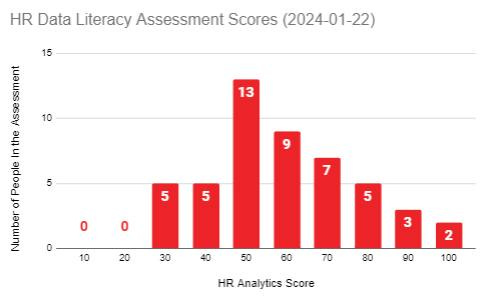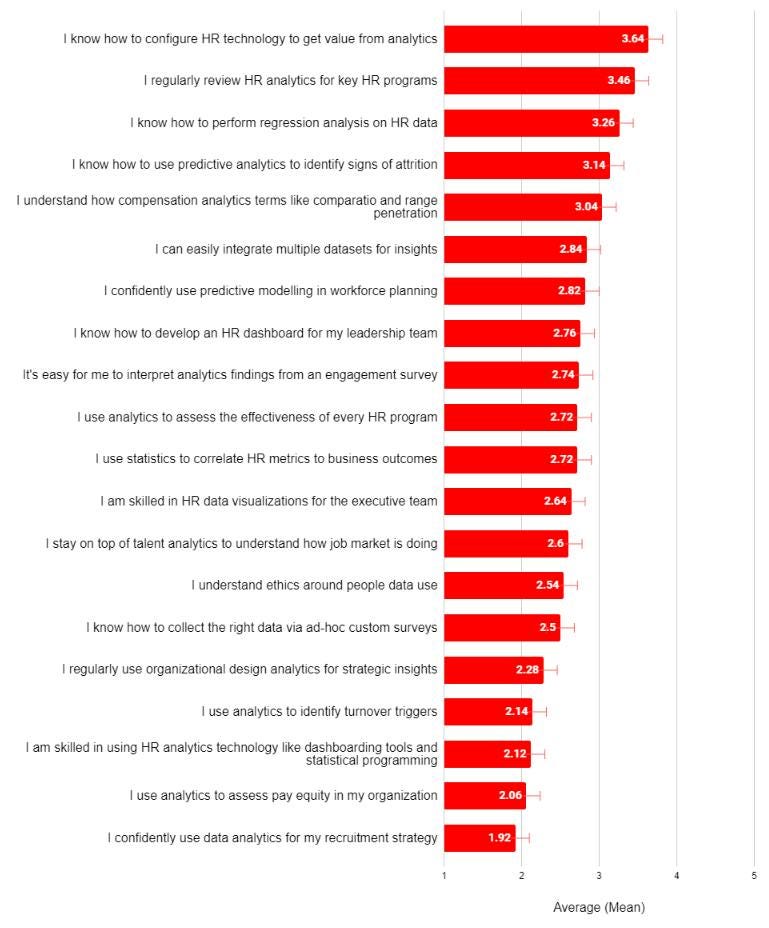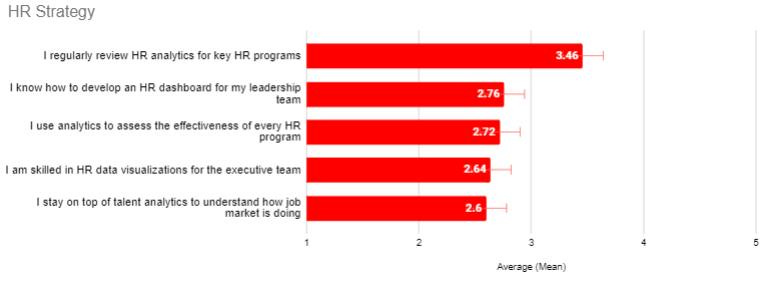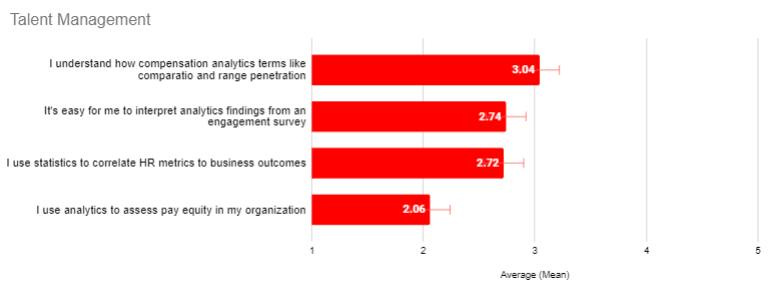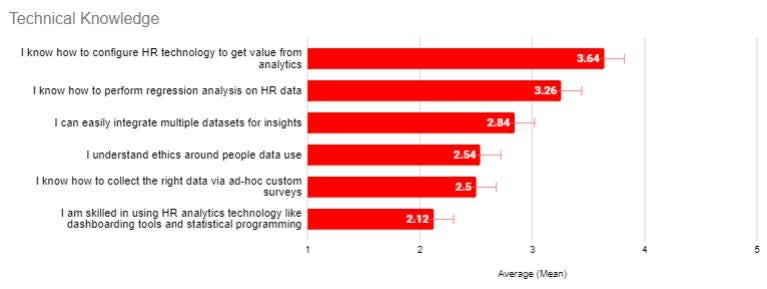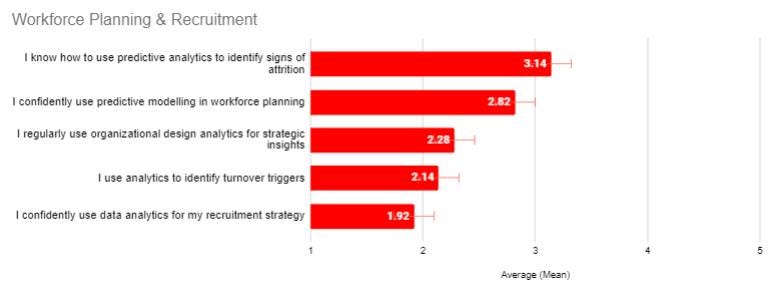Where is the HR Data Literacy as of Jan 2024?
Let's see some data!
Hi, Friends,
I hope your week is going very well! Here are some news from me:
I'm thinking about building a live, 30-day people analytics bootcamp cohort-based course called Data Wizardry for HR on how to use people data and analytics to improve retention, performance, and engagement. As you know, I’ve taught and consulted on this topic for 12 years now across multiple contexts, from academia to financial services to tech companies. I even created two self-paced online courses. But I think learning can be more fun and more effective in the live format.
Fill out this survey to get on the waitlist & be the first to hear when enrollments open.
↓
Now to the newsletter!
I was interested in testing this conclusion and went out to collect some data via my HR Data Literacy Assessment, which I promoted on its own and in my free People Analytics 101 course.
To cut to the chase, this generated a preliminary sample of responses [n = 50] that I wanted to break out of today.
So, today, we will cover:
The overall score
The highs and lows of the assessment
Simple breakouts of each area covered in the assessment
Let's get going.
Overall Score = 54.47
What does that even mean?
The assessment consists of 20 quick questions, each evaluated on a Likert-type 5-point scale (1 = Strongly Disagree, 5 = Strongly Agree). All items are keyed positively, meaning a higher score represents higher confidence in / self-evaluation of People's Analytics abilities.
Hence, the Overall Score is the sum that ranges from 20 to 100.
The average score in this sample was 54.47; relatively low.
Moreover,
only 20% of people scored above 80%
and 47% scored below 60
These data tell us that most people in HR do not feel incredibly confident in people analytics just yet.
The highs and the lows
So, where are we doing well and not so well?
Take a look at the averages in this graph:
Let's start with the top 5!
Most people feel more confident about:
Configuring HR Technology for Analytics
Reviewing analytics for HR programs
Knowing how to perform regression analysis (whaaaa!? 🤯)
How to use predictive analytics to identify signs of attrition
And using analytics in compensation
I have to say, I was pretty surprised about these findings as I did not expect these items to score higher. That said, note that these averages never get to 4 or 5, suggesting there are ways to go until we get better at all these things.
The lows:
Knowing how to use analytics in org. design
Understanding triggers of turnover
Knowing how to use dashboarding and statistical programming
Understanding how to assess pay equity in the organization
And finally, analytics in recruitment
It is an interesting insight, especially given that the latter 4 are probably the most important areas to tackle.
So, in other words, though we focus on talent acquisition, pay equity, HR metrics, and turnover a lot, perhaps organizations are not using much analytics in these areas just yet.
At least not the most sophisticated versions available yet, relying on simpler tools and approaches.
Let's do a quick dive into specifics!
HR Strategy
Here, we see an outlier in terms of the measurement of critical programs. And it looks like most people are feeling okay about developing HR dashboards, assessing the effectiveness of programs, creating visualizations for the exec team, and staying on top of analytics.
Granted, these are not the scores we want to see, and I hope that over the next few years, we will be able to move the bar more to the right, where people will confidently agree that they can easily do all analytics that drive business outcomes forward.
Talent Management
As expected, we see that comp analytics are being used and understood by many, and that is natural, as comp is all about numbers. We see similar confidence in engagement surveys and connecting HR metrics to business outcomes.
Oddly, we are seeing that many organizations have yet to use analytics for pay equity. Ironically, this evaluation would be more straightforward than the correlations between HR metrics and business outcomes. So, perhaps, my technical mind is lost on this observation.
Technical Knowledge
What surprised me most was item number 2:
Many people felt they knew how to run a regression analysis on HR data.
Yet, I am yet to meet someone else in HR who runs regressions on their data. 😕
I think this would be a conundrum for me to noodle on: Is there something you need to tell me, friends?
This is corroborated by the low scores on the last question here around statistical programming and dashboarding: perhaps people use Excel to run regressions?
Workforce Planning & Recruitment
Finally, we see that most people feel more confident about their predictive analytics but struggle with analytics in recruitment strategy.
This seems odd to me as most organizations spend so much money and effort recruiting the best talent. Shouldn't we be using analytics in this area more at the end of the day?
Additional Data Points:
On average, the practitioners said that HR teams are not very skilled in HR analytics (Score of 1.92/5), and their own team is not skilled in HR analytics (Score of 1.97/5). They did feel okay about their skill levels, however (3.26/5).
After all, all people who came to take an assessment are more interested in analytics, so perhaps it is directionally correct.
I hope to see higher scores in the future and more HR professionals learning to use analytics daily. It would lead to a revolution towards a more strategic and data-driven HR.
If you are interested in learning analytics some more, check out my Practical People Analytics Course, which covers regressions, dashboards, and pay equity analysis.
Laters,
K
Whenever you're ready, there are 2 ways I can help you:
#1
If you're still looking to get started in People Analytics, I recommend starting with my affordable course:
Practical People Analytics: Build data-driven HR programs to 10x your professional effectiveness, business impact, and career. This comprehensive course will teach you everything from building an HR dashboard for business results to driving growth through more advanced analytics (i.e., regression). Join your peers today!
#2
If you are looking for support in your human capital programs, such as engagement, retention, and compensation & benefits, and want to take a more data-driven approach, contact me at Tskhay & Associates for consulting services. Or simply reply to this email!


